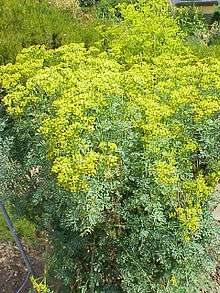Definify.com
Webster 1913 Edition
Rue
Rue
(rṳ)
, Noun.
[F.
rue
, L. ruta
, akin to Gr. ῥυτή
; cf. AS. rūde
.] 1.
(Bot.)
A perennial suffrutescent plant (
Ruta graveolens
), having a strong, heavy odor and a bitter taste; herb of grace. It is used in medicine. Then purged with euphrasy and
The visual nerve, for he had much to see.
rue
The visual nerve, for he had much to see.
Milton.
They [the exorcists] are to try the devil by holy water, incense, sulphur,
rue
, which from thence, as we suppose, came to be called herb of grace. Jer. Taylor.
2.
Fig.: Bitterness; disappointment; grief; regret.
Goat’s rue
. See under
– Goat
. Rue anemone
, a pretty springtime flower (
– Thalictrum anemonides
) common in the United States. Wall rue
, a little fern (
Asplenium Ruta-muraria
) common on walls in Europe.Rue
,Verb.
T.
[
imp. & p. p.
Rued
(rṳd)
; p. pr. & vb. n.
Ruing
.] [OE.
rewen
, reouwen
, to grive, make sorry, AS. hreówan
; akin to OS. hrewan
, D. rouwen
, OHG. hriuwan
, G. reuen
, Icel. hryggr
grieved, hrygð
sorrow. √ 18. Cf. Ruth
.] 1.
To lament; to regret extremely; to grieve for or over.
Chaucer.
I wept to see, and
rued
it from my heart. Chapmen.
Thy will
Chose freely what it now so justly
Chose freely what it now so justly
rues
. Milton.
2.
To cause to grieve; to afflict.
[Obs.]
“God wot, it rueth me.” Chaucer.
3.
To repent of, and withdraw from, as a bargain; to get released from.
[Prov. Eng.]
Rue
,Verb.
I.
1.
To have compassion.
[Obs.]
God so wisly [i. e., truly] on my soul
rue
. Chaucer.
Which stirred men's hearts to
rue
upon them. Ridley.
2.
To feel sorrow and regret; to repent.
Work by counsel and thou shalt not
rue
. Chaucer.
Old year, we'll dearly
rue
for you. Tennyson.
Webster 1828 Edition
Rue
RUE
,Verb.
T.
ru.
To lament; to regret; to grieve for; as, to rue the commission of a crime; to rue the day.
Thy will chose freely what it now so justly rues.
RUE
,Verb.
I.
RUE
,Noun.
RUE
,Noun.
ru.
A plant of the genus Ruta, of several species. The common garden rue is medicinal, as a stimulant and detergent.
Definition 2026
rue
rue
English
Noun
rue (uncountable)
- (archaic or dialectal) Sorrow; repentance; regret.
- (archaic or dialectal) Pity; compassion.
Derived terms
Translations
Repentance, regret
|
|
Pity, compassion
|
|
Etymology 2
Old English hrēowan, perhaps influenced by Old Norse hryggja (“to distress, grieve”)[1], from Germanic. Cognate with Dutch rouwen, German reuen.
Verb
rue (third-person singular simple present rues, present participle ruing or rueing, simple past and past participle rued)
- (obsolete, transitive) To cause to repent of sin or regret some past action.
- (obsolete, transitive) To cause to feel sorrow or pity.
- (transitive) To repent of or regret (some past action or event); to wish that a past action or event had not taken place.
- I rued the day I crossed paths with her.
- (Can we date this quote?) Chapman
- I wept to see, and rued it from my heart.
- (Can we date this quote?) Milton
- Thy will chose freely what it now so justly rues.
- (archaic, intransitive) To feel compassion or pity.
- Late 14th century Geoffrey Chaucer, ‘The Franklin's Tale’, Canterbury Tales
- Madame, reweth upon my peynes smerte
- (Can we date this quote?) Ridley
- which stirred men's hearts to rue upon them
- Late 14th century Geoffrey Chaucer, ‘The Franklin's Tale’, Canterbury Tales
- (archaic, intransitive) To feel sorrow or regret.
- (Can we date this quote?) Tennyson
- Old year, we'll dearly rue for you.
- (Can we date this quote?) Tennyson
Usage notes
- Most frequently used in the collocation “rue the day”.
Translations
to repent or regret a past action or event
Etymology 3

Rue (plant)
From Anglo-Norman ruwe, Old French rue (> modern French rue), from Latin rūta, from Ancient Greek ῥυτή (rhutḗ). Compare rude.
Noun
rue (plural rues)
- Any of various perennial shrubs of the genus Ruta, especially the herb Ruta graveolens, formerly used in medicines.
- 1590, Edmund Spenser, The Faerie Queene, III.2:
- But th'aged Nourse, her calling to her bowre, / Had gathered Rew, and Savine, and the flowre / Of Camphora, and Calamint, and Dill [...].
- c. 1600, William Shakespeare, Hamlet, Act 4, Scene 5, Ophelia:
- There’s fennel for you, and columbines: there’s rue for you; and here’s some for me: we may call it herb-grace o' Sundays: O you must wear your rue with a difference.
- 1590, Edmund Spenser, The Faerie Queene, III.2:
Synonyms
- garden rue
- herb of grace
Derived terms
- goat's rue
- rue anemone
- Syrian rue
- wall rue
Translations
any of various perennial shrubs
|
|
References
Anagrams
French
Pronunciation
- IPA(key): /ʁy/
Etymology 1
Developed figuratively from Latin ruga (“wrinkle”).
Noun
rue f (plural rues)
Derived terms
Etymology 2
From Latin rūta, from Ancient Greek ῥυτή (rhutḗ).
Noun
rue f (plural rues)
- rue (the plant)
Etymology 3
From ruer
Verb
rue
- first-person singular present indicative of ruer
- third-person singular present indicative of ruer
- first-person singular present subjunctive of ruer
- first-person singular present subjunctive of ruer
- second-person singular imperative of ruer
Norman
Etymology
Developed figuratively from Latin ruga (“wrinkle”).
Pronunciation
Noun
rue f (plural rues)
Old French
Noun
rue f (oblique plural rues, nominative singular rue, nominative plural rues)
- rue (plant)
Descendants
References
- (fr) Godefroy, Frédéric, Dictionnaire de l'ancienne langue française et de tous ses dialectes du IXe au XVe siècle (1881) (rue, supplement)
- rue on the Anglo-Norman On-Line Hub